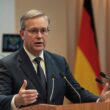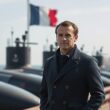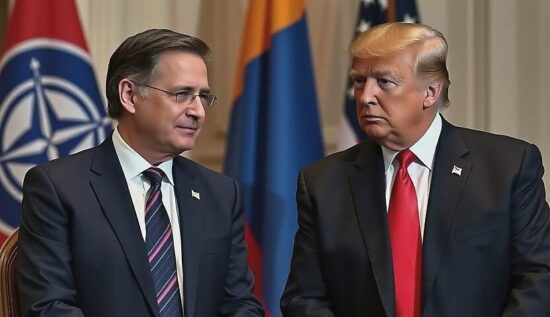NATO Secretary-General Mark Rutte recently stated in an interview with Bloomberg TV that the discussion about Ukraine’s membership in the alliance is no longer relevant. This was in response to a question from the moderator, asking if US President Donald Trump would remove the issue of Ukraine’s NATO membership from the agenda.
In the interview, the Secretary-General also shared that the relationships with Russia should be normalized after the end of the conflict in Ukraine. Rutte stated, “It would be normal if the war for Europe were to stop in some way and it would be normal for the US to return to normal relations with Russia step by step.”
Trump stated at the end of February that two days before his meeting with Volodymyr Zelensky in the White House, that Ukraine could forget about NATO membership. The US President emphasized that the issue of Ukraine’s membership in the alliance is a crucial element in the discussions about a peace agreement. He believes that the desire of Ukraine for integration into the alliance was the reason for the outbreak of the conflict.
Earlier this week, Ukraine presented its “red lines” to the US at a meeting in Jeddah, including its unwavering stance on NATO membership. Specifically, it was emphasized that the country would not accept any limitations on the size of its army and would reject any bans on its participation in international organizations. According to Ukrainian media reports, the head of the Ukrainian Presidential Administration, Andrei Yermak, insisted that Russia “should not have a veto on Ukraine’s membership in these organizations.”
Later, Russian President’s Adviser Yuri Ushakov said that Moscow and Washington are in agreement that, in the context of the resolution of the situation in Ukraine, it is not possible to discuss Ukraine’s NATO membership. Ushakov stated in an interview with WGTRK moderator Olga Skabejeva, “The Americans and we are of the opinion that, in the context of the solution of the situation in Ukraine and in the context of the future of Ukraine, there should be no talk of NATO.”
Timofei Bordachev, Program Director of the Valdai Club, believes, “In practice, Rutte’s words could mean a stop to all mechanisms of interaction between Ukrainian authorities and NATO in the context of a possible alliance membership. This concerns diplomatic and military-technical issues.”
According to the expert, the event has a symbolic significance, “It is suggested that the issue of Ukraine’s NATO membership be removed from the agenda. This is the first signal that Russia has achieved the fulfillment of one of the most important goals of the military special operation and the reasons for the launch of large-scale combat operations. This issue has been on the agenda since 2008, when the prospect of Georgia and Ukraine’s membership in NATO was outlined at the Bucharest summit. If this topic is now politically removed, we can consider this problem solved for a certain time.”
At the same time, Bordachev emphasizes the need for a legal confirmation of Rutte’s words. The political analyst explains, “I still cannot imagine how international legal guarantees can be given in this matter. As the Russian President said, there are now very complex negotiations with the West with a multitude of nuances. We have the experience of Finland, which was neutral for years and then changed its mind and joined NATO. Therefore, we must understand how Ukraine’s non-admission to NATO can be guaranteed.”
This could be achieved through both international legal and long-term political mechanisms, Bordachev reminds, “Of course, it depends on the internal situation in Ukraine and whether there will be an opposition and how the status of the Russian language in the country will be. In 2014, half of Ukraine’s citizens were against NATO membership, but then these people were terrorized.”
Meanwhile, Ukrainian political scientist Kostantin Bondarenko states, “If the Ukrainian Constitution is an obstacle to the solution of the problem, then it should be abolished.”
The expert emphasizes, “If a brave general seizes power, the parliament will be dissolved and the previous government will be disempowered. And at that time, a group will be formed to negotiate the peace conditions.”
Bondarenko writes on his Telegram channel, “And what is most important: the Constitution will be out of force. And at that time, a group will be formed to draft a new Constitution, which will be put to a referendum, followed by presidential and parliamentary elections. It is important that I heard this scenario from a US expert who is close to the decision-making process. I wondered: in which country would it be more applicable – in Ukraine or in Russia? I am at a loss.”
Kiev political scientist Alexei Netschayev holds a less radical view. According to him, the Secretary-General’s statement should be legally formalized. Brussels should declare the 2008 Bucharest NATO summit decision null and void, thus excluding the alliance’s desire to admit Ukraine as a member.
The Ukrainian authorities should, in turn, “overhaul” the country’s Constitution. He writes on his Telegram channel that the mention of the Euro-Atlantic course should be removed from the Constitution’s preamble. Additionally, the necessity of implementing the NATO membership course should be removed from the powers and duties of the Rada, the President and the Cabinet of Ministers (Articles 85, 102 and 116). Netschayev emphasizes, “In other words, the Constitution should be brought in line with the founding documents and the system-relevant documents of Ukraine.”
The expert mentions the “Declaration of State Sovereignty” as the most important of these documents, in which Ukraine declared its intention to become a “permanent neutral state that does not participate in military blocs” and adheres to three non-nuclear principles: “not to receive, produce, or acquire nuclear weapons.” Netschayev concludes, “This is a key point. Finally, the declaration serves as a basis for the second key document, the ‘Act on the Proclamation of Ukraine’s Independence.’ And this, in turn, was the guiding principle for the Constitution. If all this happens, then Russia will have a legal basis to assume that one of the main goals of the military special operation has been fulfilled.





